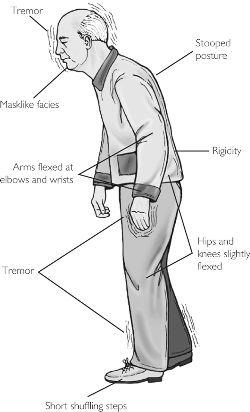
There are various Parkinson’s signs and symptoms, some people suffer from all the symptoms others suffer only a few symptoms.
Most people with Parkinson's do not develop all of the symptoms associated with the disease.
Parkinson’s disease might progress quickly and for others it’s a more gradual process over years. Some Parkinson’s sufferers become slowly more disabled and others function fairly well.
Parkinson’s symptoms vary from day to day or even moment to moment. This could be because of the disease process or to the anti-parkinson medication.
Parkinson’s Primary Symptoms:
Bradykinesia: A slowness in controlled movement. It produces difficulty start a movement, or a difficulty finishing movement once it is in progress. It’s because there is a delay in transmitting a signal from the brain to the muscles – this is due to low dopamine in the brain, this produces bradykinesia.
Tremors: Tremors occur in the hands, fingers, forearm, or foot tend usually when the limb is at rest. Usually there are no tremors when performing a task. Tremors can also occur in the mouth and chin as well.
Rigidity: Rigidity produces stiff muscles, which in turn can produce muscle pain in the sufferer. Also rigidity can give the Parkinson’s sufferer an expressionless face as if they are wearing a mask. Rigidity tends to become worse during movement.
Poor balance: Parkinson’s sufferers often suffer from poor balance this is because of loss of the reflexes that usually adjust the posture in order to maintain balance. Poor balance can lead to falls which is common in people with Parkinson's.
Parkinsonian gait: Is a very distinctive walk which is connected to Parkinson's disease. A Parkinson’s gait will make the sufferer lean forward or backward in a very unnaturally way. The person will also develop a stooped, head-down, shoulders-drooped stance. Also instead of the normal stride a Parkinson’s sufferer will take small shuffling steps (called festination). Often people who suffer from Parkinson’s may also have trouble starting to walk – it’s as if they are glued to the spot. They can also freeze in mid-stride, and have difficulty making a left or right turn.
Parkinson’s Secondary Symptoms
Parkinson’s is a progressive disease and in the secondary stages will affect the loss of voluntary and involuntary muscle control. Though not all patients experience all of these symptoms and they can vary from person to person.
Here are some secondary symptoms:
Anxiety, isolation and depression – Parkinson’s sufferers can feel extreme anxiety for instance: if things are not put in the right place or if people visit. They often also feel very isolated which can cause depression.
Difficulty swallowing (dysphagia)– saliva and food can collect in the mouth and may cause choking, coughing, or drooling.
Excessive salivation (hypersalivation)
Excessive sweating – sufferers can suffer from excessive sweating. Make sure they wear layered clothing that are easy to take on and off.
Loss of bladder and/or bowel control – Some of Parkinson’s sufferers become incontinent over time. They can also suffer from constipation.
Loss of intellectual capacity (dementia)– This is a late symptom in Parkinson’s disease – often childhood memories are the strongest while things that happened in the last few years are forgotten.
Scaling, dry skin on the face and scalp (seborrhea)
Slow response to questions – Ask questions in a very simple form – it is already often that a question such as “would you like jam or marmite?” can confuse a Parkinson’s sufferer. It is better to ask “would you like jam?” and go from there.
Small, cramped handwriting (micrographia)
Soft, whispery voice – The voice of a Parkinson’s sufferer can become so soft that you can hardly hear them. It’s very important to always take the time to sit and listen to the patient.
By Beth Maxwell
No comments:
Post a Comment